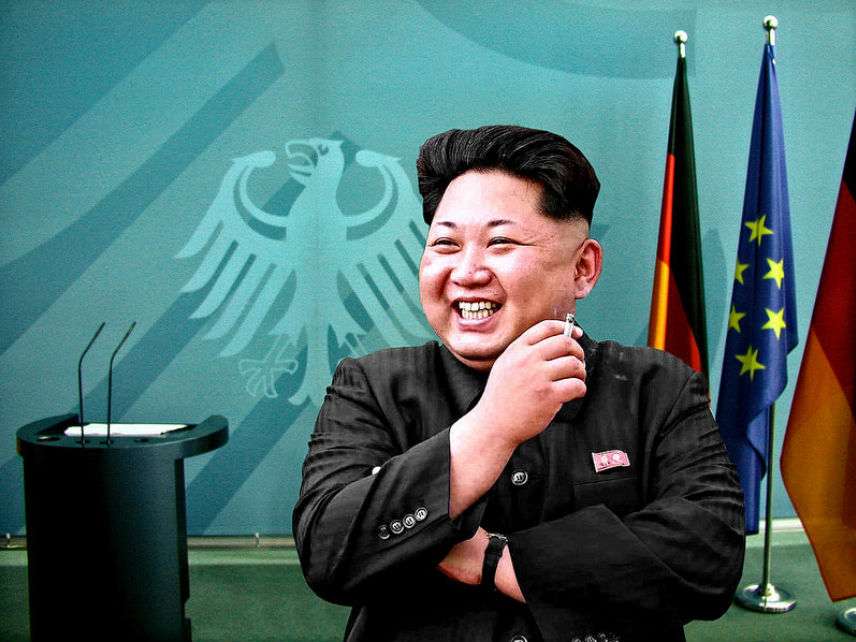North Korea, U.S., Not Actually Looking For War
Leave room for misinterpretation.

The greatest threat of the North Korea crisis could be the threat inflation itself. Despite the rhetoric on both sides, North Korea decidedly does not pose an existential threat to the United States.
For all his bluster, President Trump's provocational comments on North Korea mostly re-iterate that in a confrontation with a nuclear-aspiring power, the U.S. can hold up its end of the "Mutually Assured Destruction" (MAD) doctrine that kept the Cold War nuclear weapons use free.
North Korea has expended a lot of effort on its nuclear weapons program, but even in the worst-case scenario, a nuclear first strike on the U.S. or one of its allies, there would be no second strike.
A New York Times report today noted that "behind the North's belligerent rhetoric, some analysts see a leadership anxious to avoid a war it can't win, and careful to leave itself a rhetorical way out even as it makes threats."
The North Korean regime did not react to a U.S. bomber escorted by jet fighters flying close to its eastern shore over the weekend, The Times noted. When North Korea's foreign minister insisted recently at the U.N. that North Korea could shoot down U.S. planes, even outside its territory, he carefully couched it by reserving that right.
"When he (Trump) speaks, I have to figure out what he means, and what his next move will be. This is very difficult," Pak Song Il, who is in charge of interpreting U.S. politics and actions for the North Korean regime, told The New Yorker earlier this month. "He might be irrational—or too smart. We don't know."
Actions like the invasion of Iraq are a lot more destabilizing than any of this kind of bluster. They create dangerous power vacuums, in which terror groups like ISIS thrive, and their unpredictability leads other countries to be more likely to act unpredictably themselves.
In 2002, President George W. Bush lumped Iraq, Iran, and North Korea into an "axis of evil" that he argued posed an acute threat to U.S. national security.
Not long after, the U.S. invaded Iraq. In response, Libya's Col. Moammar Qaddafi announced his regime would unilaterally relinquish its weapons of mass destruction, the supposed raison d'etre for the Iraq War.
Qaddafi was hoping to avoid the fate of Iraq's Saddam Hussein, but a few years later the U.S. backed an intervention that saw the overthrow of Qaddafi.
The U.S., Iran, and a number of other major powers were able to come to an agreement over Iran's nuclear program, avoiding war, which the U.S. insisted throughout remained on the table as an option.
But Iran has always denied it had an interest in developing nuclear technology for weapons use. North Korea, on the other hand, has embraced its pursuit of nuclear weapons technology.
This and the lack of any kind of democratic process (Iran has highly controlled but democratic elections for president which saw a relative moderate replace a firebrand, opening the possibility of dialogue) makes it hard to imagine North Korea taking much stock in Iran as a path forward for itself. Trump's negative posture toward the Iran deal also makes that more difficult.
Multi-party talks with North Korea and five global powers including the U.S. collapsed in 2009.
The Iraq error has been compounded since then. The war, and the 2011 decision to intervene in Libya, have not only offered a warning against careless interventions, but helped to inform North Korea's decision-making.
The commander of the U.S. Pacific Fleet, Admiral Scott Swift has said that U.S. policy toward North Korea has been successful so far because there hasn't been a war yet. But the U.S. should work toward more.
Whether the goal is to extricate the U.S. from a fundamentally regional crisis or to aid in a diplomatic solution, deflating the perception of the threat is an important first step.


Show Comments (173)